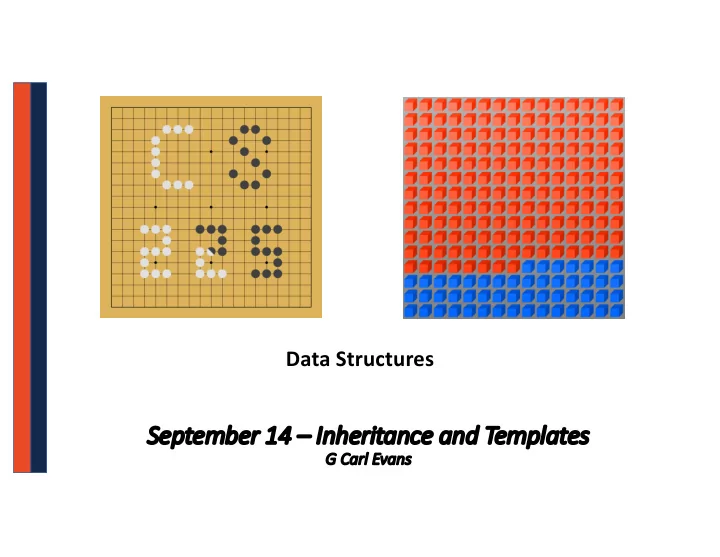

Data Structures Se Septembe ber 14 14 – In Inheritance and Templates G G Carl Evans
Ex Exampl ple: assignmentOpSelf.cpp 1 #include "Cube.h" 2 3 int main() { 4 cs225::Cube c(10); 5 c = c; 6 return 0; 7 }
Ex Exampl ple: assignmentOpSelf.cpp 1 #include "Cube.h" … 40 Cube& Cube::operator=(const Cube &other) { 41 42 _destroy(); 43 _copy(other); 44 45 return *this; 46 }
In Inher erit itan ance ce
Square.h Square.cpp 1 #pragma once 8 2 9 3 #include "Shape.h" 10 4 11 5 class Square : public Shape { 12 6 public: 13 7 double getArea() const; 14 8 15 9 private: 16 10 // Nothing! 17 11 }; 18 19 Shape.h 20 21 4 class Shape { 22 5 public: 23 6 Shape(); 24 7 Shape(double length); 25 8 double getLength() const; 26 9 27 10 private: 28 11 double length_; … 12 };
Der Deriv ived ed Clas lasses es [Public Members of the Base Class]: main.cpp 5 int main() { 6 Square sq; 7 sq.getLength(); // Returns 1, the length init’d 8 // by Shape’s default ctor … ... … } [Private Members of the Base Class]:
Po Polymorphism The idea that a single interface my take multiple types or that a single symbol may be different types. In Object-Orientated Programming (OOP) a key example is that a single object may take on the type of any of its base types.
Vi Virtua ual
Cube.cpp RubikCube.cpp 1 1 Cube::print_1() { // No print_1() in RubikCube.cpp 2 cout << "Cube" << endl; 2 3 } 3 4 4 5 Cube::print_2() { 5 RubikCube::print_2() { 6 cout << "Cube" << endl; 6 cout << "Rubik" << endl; 7 } 7 } 8 8 9 virtual Cube::print_3() { 9 // No print_3() in RubikCube.cpp 10 cout << "Cube" << endl; 10 11 } 11 12 12 13 virtual Cube::print_4() { 13 RubikCube::print_4() { 14 cout << "Cube" << endl; 14 cout << "Rubik" << endl; 15 } 15 } 16 16 17 // In .h file: 17 RubikCube::print_5() { 18 virtual print_5() = 0; 18 cout << "Rubik" << endl; 19 19 } 20 20 21 21 22 22
Runtime of Ru of V Virt rtual F Function ons RubikCube rc; virtual-main.cpp Cube c; RubikCube c; Cube &c = rc; c.print_1(); c.print_2(); c.print_3(); c.print_4(); c.print_5();
Wh Why Polymorphism?
animalShelter.cpp 1 class Animal { 2 public: 3 void speak() { } 4 }; 5 6 class Dog : public Animal { 7 public: 8 void speak() { } 9 }; 10 11 class Cat : public Animal { 12 public: 13 void speak() { } 14 };
Ab Abstract Cl Class: [Requirement]: [Syntax]: [As a result]:
virtual-dtor.cpp 15 class Cube { 16 public: 17 ~Cube(); 18 }; 19 20 class RubikCube : public Cube { 21 public: 22 ~RubikCube(); 23 };
MP2: cs225/PNG.h 18 class PNG { 19 public: 23 PNG(); 30 PNG(unsigned int width, unsigned int height); 37 PNG(PNG const & other); 43 ~PNG(); 50 PNG & operator= (PNG const & other); 57 bool operator== (PNG const & other) const; 73 bool readFromFile(string const & fileName); 80 bool writeToFile(string const & fileName); 90 HSLAPixel & getPixel(unsigned int x, unsigned int y) const; 96 unsigned int width() const; // ... 118 private: 119 unsigned int width_; 120 unsigned int height_; 121 HSLAPixel *imageData_; 127 void _copy(PNG const & other); 132 };
Ab Abstract D Data T Type
Li List A ADT
Wh What types of “stuff” do we want in our list?
Te Templates
template1.cpp 1 2 3 T maximum(T a, T b) { 4 T result; 5 result = (a > b) ? a : b; 6 return result; 7 }
List.h List.cpp 1 1 #pragma once 2 2 3 3 4 4 5 class List { 5 6 public: 6 7 7 8 8 9 9 10 10 11 11 12 12 13 13 14 14 15 private: 15 16 16 17 17 18 18 19 }; 19 20 20 21 #endif 21 22 22
Recommend
More recommend